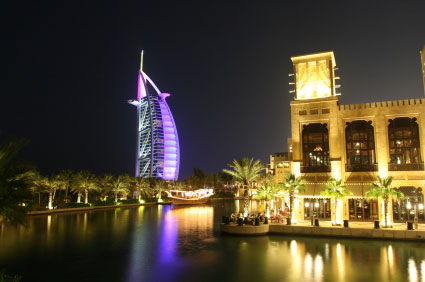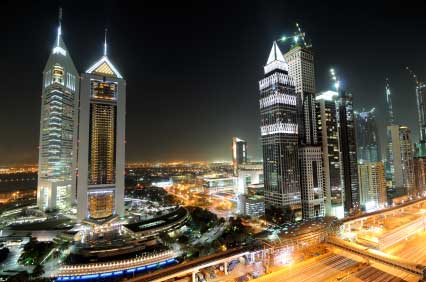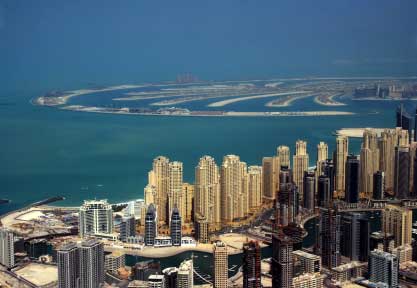
The playground of the rich and famous, Dubai is known worldwide for its decadence in all aspects of life, from lavish beach resorts to stunningly unorthodox architecture. Complete with tax-free salaries it’s no surprise that Dubai remains one of the busiest destinations for expats. While the influx of foreigners has lead to an increase in competition over the years, the blissful surroundings and year-long heat mean that Dubai should still be on your shortlist. Also, there are handy expat packages available which include medical expenses, schooling and housing. If you are an expat with a family then Dubai has excellent international schools to ensure your children receive a strong education away from home.
The weather in Dubai is, as expected, hot. From May to September the average temperature ranges from 30 to 36 degrees Celsius, whilst December to February average a relatively mild 19 to 21. At night temperatures may drop significantly, so if you are there in the winter months pack a warm jacket for evening use.
Employment, Work Permits and Visas
Dubai places strong emphasis on its service-based economy and thus there are many different types of expat jobs available in a host of differing sectors including financial services, information technology, tourism, property and the media.
Dubai, and the rest of the UAE, is fairly strict with regards to the movements of foreigners. Gaining visas and work permits can often prove to be tricky, with much bureaucratic red tape surrounding the procedures. British nationals can acquire a visa on entry, and it can easily be extended if necessary. However, in order to live and work you will need a Resident Visa that requires your employer to sponsor you. This is valid for three years and can be extended so long as your company is still employing you.
It is commonplace in Dubai for work officials to conduct random checks to root out illegal labourers, so it is advisable to carry valid identification at all times. Of course, being a legitimate expat worker you will likely have a smooth and easy time in Dubai, but it’s always better to be safe than sorry.
Business Culture
Business is conducted differently in Dubai than how you may be used to at home. A strong emphasis is placed on showing respect and saving face. Be careful to never admonish or criticise a co-worker in front of others for this will cause embarrassment and the dreaded “loss of face”. This will cause the recipient to become uneasy and may jeopardise your future relations. If you must speak to someone about sensitive matters make sure it is done behind closed doors on a one-to-one level. Always carry yourself in a humble manner and refrain from behaving in a boorish or boastful way, what is the norm in the west can cause great offence in the middle east. Business hours in Dubai differ greatly to the west, the working week usually starts on Saturday and goes on until Wednesday, with office hours commencing at eight o’ clock, breaking at one, often for an extended lunch till four at which point you can expect the day to end at seven. It is not uncommon for workers to take afternoon naps to help get through the strong heat of the day.
Always maintain a smart dress code, even in the face of blistering heat. Since Islamic law rules over Dubai, make sure not to arrange any business meetings or even telephone colleagues on a Friday as this is the Muslim day of prayer. Business meetings are often held outside the office; in hotels or restaurants. They usually begin with chit-chat to maintain a friendly relationship. Of course always remember that alcohol is strictly forbidden so don’t ask for a beer during a business lunch.

Accommodation
Expats seeking accommodation in Dubai will find that the most popular types of housing for foreign workers are apartments or villa complexes. Depending on who you are employed with your company may actually have their own exclusive expat compounds where you can take up residence. These compounds are often kitted out with their own leisure facilities and offer luxury accommodation. When renting a property you will find that the usual practice is to pay a year’s rent upfront. Finding accommodation is not difficult in Dubai as there is a lot of new residential development. There are estate agents aplenty who ply their services via newspaper adverts, online and of course form their own premises. Areas favoured by expats include the villas at Satwa and Garhoud, and Al Quoz and Al Barsh.
Transport
Taxi cabs offer the best option of getting around Dubai. They are generally cheap and plentiful. Buses are also easy to come by but are split into segregated compartments for men and women. To drive an automobile in Dubai you must first obtain a valid UAE drivers licence. However, holders of a British driving licence can apply for a UAE licence without having to take a test. Nevertheless be wary as minor offences such as speeding come with heavy fines and sanctions. If you were to be caught drunk driving then you could find yourself banished from Dubai entirely, as they have zero tolerance for such offences. Bizarrely even though such heavy sanctions are in place for offences, actual driving etiquette is pretty much non-existent, haphazard driving is the norm and accidents are a frequent occurrence.
Healthcare
A lot of money has been invested in healthcare meaning that Dubai has a premier system in place. There is a huge range of both private and public healthcare facilities boasting cutting edge treatments and technology. However, foreigners must have applied for and received a health card, although these can be used in public facilities for emergencies only. Private health insurance is a must, even though there is no obligation under the law. Often your employer will pay but make sure you have adequate cover before entering the country.
Education
Children of British expatriates traditionally attend one of the many international schools found in Dubai. Amongst these you will find one that operates a British curriculum for your child if preferred. These schools may require that your child sit an entrance exam, or they may ask for a report detailing the child’s previous academic accomplishments. Fees are often varied with some schools being more expensive than others. There are a few universities in Dubai but generally people travel abroad for higher education.
Lifestyle and Entertainment
In a country like Dubai you will come across culture that is vastly different to that of the west. Miscommunication can often cause great offence and for this reason it’s wise to familiarise yourself with the do’s and don’ts of Dubai life.
Dubai natives are generally understanding with regards to social blunders made by westerners. However, one must remember that whilst living in a foreign country it is up to you to adhere to local customs. Also be aware that some actions that are commonplace in the western world can in fact be seen as criminal activities in the UAE.
Dubai, like most other Muslim countries, has quite strict rules in regards to civilian dress codes. Western women are not expected to wear the same type of attire as local women, but they are expected to dress conservatively, avoiding garments that reveal legs, arms and shoulders.
For men the general dress code is a shirt and light trousers, but with the influx of tourism to the UAE this is changing. When in the office suits are generally eschewed in favour of shirt, tie and light trousers. Suits are saved for important meetings and functions.
Westerners are free to enjoy alcohol in hotel bars but you should never become overtly drunk and cause any sort of drunken scene. Public displays of affection are also frowned upon but if you carry yourself in a respectable way you will find that you can make many friends in the UAE. Hotels will often host an array of clubs and bars where you can let your hair down after a busy week.

Foodies will find much to marvel at in Dubai, there are countless restaurants ranging from well priced local cuisine to Michelin rated fare. Dubai is also known for fabulously fresh seafood and sushi. Be aware that during the holy season of Ramadan, Dubai will become a nation of fasters and many establishments will not serve food between sunrise and sunset, once again the big hotels will be your friend.
Another big pastime in the lavish world of Dubai is shopping! With no sales tax and minimal import fees many products will be available for purchase cheaper than elsewhere, particularly high end electrical items.
Finance
Money talks in Dubai – some goods and services can be bartered for and many Emirati will offer a preferential rate if you deal in cash. However, only carry the minimum of cash that expect to need for markets and transport and use a credit card for purchases from stores and restaurants. You can still haggle the price of most things down this way and it’s a safer option. If you intend to stay in the UAE for longer than a few months then you could look into setting up a bank account with a UAE based bank.
Dubai has very strict rules regarding payment of bills, and there have been news reports of expats forgetting about payments and thus incurring harsh legal action. If your finances for the UAE are conducted within the UAE then there will be less scope for mistakes or errors.
The Dubai (and UAE) embassy can be found here: www.uaeembassyuk.net

